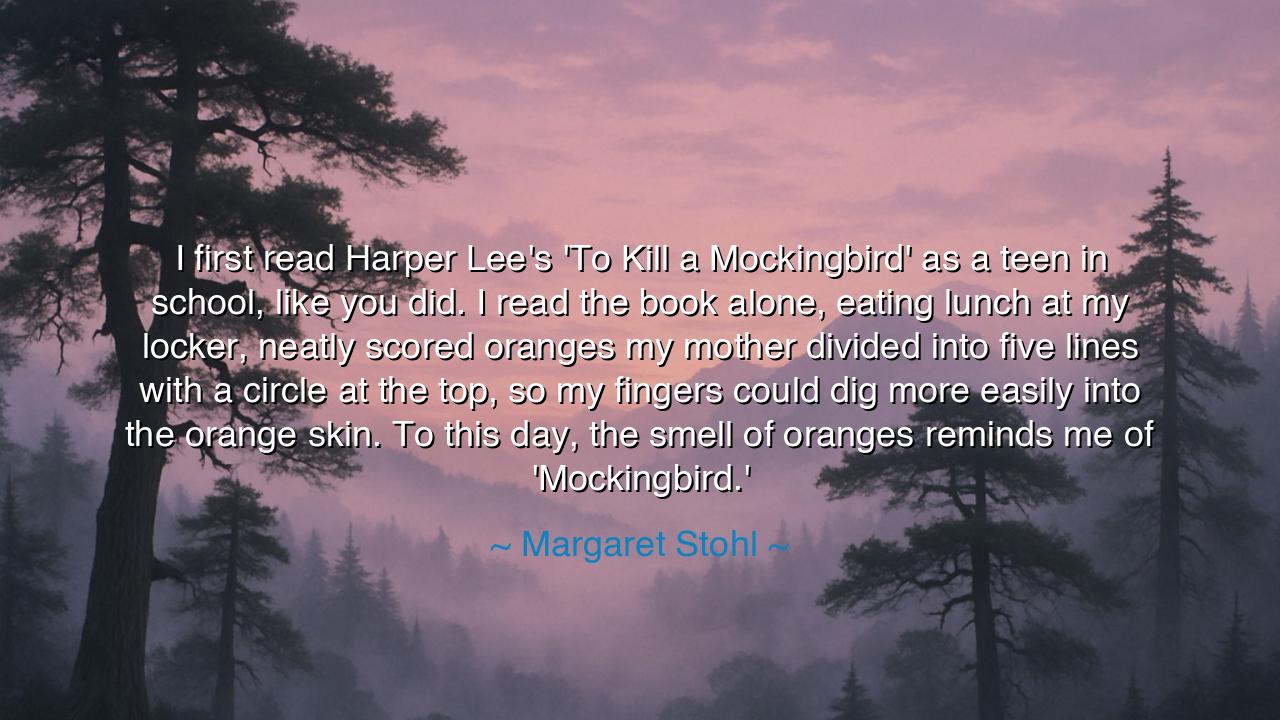
I first read Harper Lee's 'To Kill a Mockingbird' as a teen in
I first read Harper Lee's 'To Kill a Mockingbird' as a teen in school, like you did. I read the book alone, eating lunch at my locker, neatly scored oranges my mother divided into five lines with a circle at the top, so my fingers could dig more easily into the orange skin. To this day, the smell of oranges reminds me of 'Mockingbird.'






Margaret Stohl’s memory, bound in the lines of her confession, whispers of the sacred union between literature, senses, and the soul. She recalls reading Harper Lee’s To Kill a Mockingbird in the quiet solitude of her youth, seated by her locker with the humble offering of oranges, sliced with the love of her mother’s hands. In this moment, the immortal words of Lee became forever mingled with the fragrance of citrus. The smell of oranges thus became a gate to memory, a key unlocking both the wisdom of the book and the tenderness of childhood.
This is the way of the human spirit: it anchors meaning not only in the intellect but in the body’s senses. A taste, a fragrance, a sound—these can summon back not only memory, but the fullness of a time, a place, a feeling. Stohl’s oranges are not mere fruit; they are symbols of care, nourishment, and presence, carried by her mother’s thoughtful act of scoring them so her child might eat with ease. And when paired with the pages of Mockingbird, they remind us that the lessons of literature are never consumed alone—they are always flavored by the life we are living as we receive them.
The ancients knew this truth well. In the writings of Pliny the Elder, herbs, perfumes, and spices were said to carry more than scent—they carried memory, lineage, and identity. To breathe in rosemary was to recall one’s ancestors; to smell frankincense was to think of the divine. Likewise, Stohl’s recollection reveals that to her, oranges now carry not only the taste of fruit but the moral fragrance of justice, compassion, and courage, the great themes of Lee’s tale.
Consider too the example of Marcel Proust, whose writings in later centuries showed how a simple madeleine cake dipped in tea could unseal a flood of memory. Stohl’s oranges are kin to Proust’s madeleine—ordinary objects transfigured by the light of experience. In both, the lesson is the same: the smallest, most ordinary thing may forever bind itself to the great works of the spirit we encounter. To smell the orange is, for her, to recall Atticus Finch’s quiet strength and Scout’s awakening innocence.
There is also a lesson here about solitude and companionship. Stohl read alone, perhaps apart from her peers, yet she was not lonely. She was accompanied by a book, by her mother’s unseen hands, by the characters who lived in those pages. In solitude, she was nourished both by fruit for the body and by words for the soul. This teaches us that aloneness can be fertile ground, if we fill it with wisdom, art, and the quiet care of others.
What then must we learn? That when we read, when we learn, when we encounter truth, we must not take lightly the context of the moment. Cherish the small details—the food beside you, the hand that prepared it, the quiet of the place you sit—for these too will become eternal companions to the truths you discover. Just as the orange binds itself to Mockingbird, so too will your own surroundings bind themselves to the stories that shape you. Live attentively, for you are weaving the fabric of memory with every act.
Practical action follows: let every act of reading or learning be made sacred. Bring to it not only your mind but your body and your heart. Create rituals—perhaps a cup of tea, a place by the window, the scent of fruit—that will anchor the wisdom of the book into your being. Share these rituals with those you love, that they too may find that knowledge and memory entwine in ways deeper than words.
Thus, children of tomorrow, remember Stohl’s teaching: when you encounter great literature, you do not walk alone. The smells, the tastes, the hands of those who care for you, and the place you inhabit—all accompany the wisdom you receive. Treasure these companions, for they will return to you again and again, long after the book is closed, as radiant as the smell of oranges that carries a soul back to To Kill a Mockingbird.






AAdministratorAdministrator
Welcome, honored guests. Please leave a comment, we will respond soon